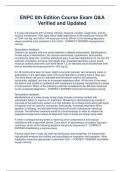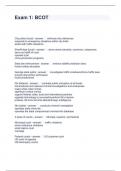ENPC 6th Edition Course Exam Q&A
Verified and Updated
A 4-year-old presents with vomiting, lethargy, frequent urination, weight loss, and dry
mucous membranes. Vital signs reveal deep respirations at 44 breaths per minute, BP
of 70/44 mm Hg, and HR of 144 beats per minute. Which of the following laboratory
values would be most expected in this child? - CORRECT ANSWER-Hypoglycemia
(wrong)
Remediation feedback:
Children can present with new onset diabetes in diabetic ketoacidosis. Manifestations
include signs of dehydration ( dry mucous membranes, hypotension, tachycardia),
incontinence (polyuria), vomiting, abdominal pain, Kussmaul respirations (to counter the
acidosis), polydipsia, anorexia, and weight loss. Expected laboratory values would
reveal an acidotic state with a pH level below 7.3, an elevated serum bIcarbonate level,
and an elevated blood glucose level > 200 mg.dL.
An 18-month-old is seen for fever, slight circumoral cyanosis, and wheezing noted on
auscultation in the right upper lobe of the lung field after a choking event 4 days ago.
The white blood cell count is elevated and the patient noted to be tachypneic,
tachycardic, agitated, and has an increased respiratory effort. At the time of the event,
the patient was started on antibiotics with subsequent increasing manifestations instead
of improvement. Which of the following would be considered to be definitive treatment
for the suspected diagnosis? - CORRECT ANSWER-Computed tomography (wrong)
Remediation feedback:
Manifestations of a lower airway foreign body include a choking incident with
subsequent failure to improve on antibiotics. Wheezing or decreased lung sounds in
one area of the pulmonary system is a high indicator for a foreign body along with signs
of hypoxia such as cyanosis, tachypnea, tachycardia, increased respiratory effort,
agitation or lethargy, and elevated white blood cell counts indicating an infectious
process. The definitive treatment would be a bronchoscopy in order to retrieve the
suspected foreign body instead of diagnostic tests to locate the foreign body itself.
A child in cardiopulmonary arrest is receiving chest compressions and manual
ventilations with a bag-mask device. Once return of spontaneous circulation has been
confirmed, which of the following would be the priority intervention? - CORRECT
ANSWER-Establishing a secure airway
Parents report their 3-year-old child has developed noisy breathing. On assessment,
high-pitched wheezes are audible and auscultated on inspiration and expiration. What
medication would be appropriate to administer first? - CORRECT ANSWER-Humidified
oxygen (wrong)
, Remediation feedback:
Wheezing is most often identified with asthma in the pediatric population. Initial
medication intervention includes an inhaled short-acting beta agonist.
A 6-week-old is brought to the emergency department by the caregivers for poor
feeding, listlessness, and fever. Assessment reveals a crying infant, HR 160
beats/minute, RR 52 breaths/minute, rectal temperature of 96.0 F (35.5 C), and a
bulging anterior fontanel. Capillary refill is 4 seconds. Based on these findings what is
the most likely diagnostic test the nurse should anticipate? - CORRECT ANSWER-
Lumbar puncture
A 12-year-old is being prepped for surgical intervention of acute appendicitis. Which of
the following intravenous medication orders should the nurse question? - CORRECT
ANSWER-Hydromorphone (wrong)
Remediation feedback:
Ketorolac is an appropriate medication for moderate to severe pain, however, it should
not be used pre-operatively due to its potential to increase the bleeding risk.
A 17-year-old female arrives in the ED with her boyfriend who states she is pregnant
and having vaginal bleeding. The patient is unsure of the gestational age and has not
had any prenatal treatment. The patient is quiet and lets her boyfriend answer most of
the questions. Which of the following is the most appropriate action for the nurse to take
at this point? - CORRECT ANSWER-Have the boyfriend leave the room during the
pelvic exam.
A 2-year-old arrives at the ED in hypovolemic shock and needs fluids immediately. After
several attempts, your team has been unsuccessful at establishing vascular access. Of
the following, which is the next best option for establishing access quickly? - CORRECT
ANSWER-Intraosseous in the patient's medial tibia.
A child with an electrical injury is seen 1 hour post event. Which of the following types of
specimen samples would provide visual information regarding a potential complication
of this injury? - CORRECT ANSWER-Sputum (wrong)
Remediation feedback:
Electrical injuries, though they may appear to be small, can produce large amounts of
damage internally, including muscle damage. Myoglobin is excreted in the urine and is
evidenced by dark, red-tinged urine.
Parents with an infant requiring multiple laboratory tests, radiographic studies, and
invasive procedures appear to be distressed and withdrawn. Which of the following
interventions would best ensure a sense of comfort and control for these parents? -
CORRECT ANSWER-Providing frequent updates and re-educating them on the care
that is being provided





